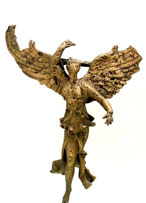| Author | |
|---|---|
| Epoch | XII-XIII |
| Work | The Man in the Panther Skin (Shota Rustaveli, The Man in the Panther Skin, Text and Versions, Edited by Akaki Shanidze and Alexandre Baramidze, Tbilisi, 1966) |
| Type | |
| Quote | “Then the immeasurable wrath of God overtook Kajeti [fortress], Watching angrily, Cronos got rid of the beneficial influence of the sun, To them also in wrath turned over the wheel and circle of the sky, The fields could not contain the corpses; the army of the dead was increasing.” (1414)v |
| Term |

| Comment | Until the end of the 60-s of the last century, no one has ever questioned the veracity of considering the Kronus - found in the line 1414, 2 of “The Man in the Panther Skin” - as an astrological term, in particular, as the name of the planet Saturn. The above-said circumstance must have been mainly caused by the fact that in a medieval glossary - attached to one of the manuscripts of “The Man in the Panther Skin” - Kronus is defined as “a star”. For the first time, the different opinion was expressed in 1969-1970-s by D. Kumsishvili and Z. Kiknadze. In their opinion, the Kronus of “The Man in the Panther Skin” is the god of the ancient Greek Mythology, i.e. Kronus. Thus, both researchers interpreted the 1414th Stanza based on the ancient Greek mythology, although - differently from each other (for details see: D. Kumsishvili, For the Issues of “Dionos” and “Divnos”, Mnatobi, 8, 1969, pg. 158-169; Z. Kiknadze, For Dionysius and Kronus in “The Man in the Panther Skin”, Tsiskari, 1969, 11, pg. 119-122; D.Kumsishvili, Remarks about the Article of Z. Kiknadze, Tsiskari, 1970, 2, pg. 142-148). E. Khintibidze substantiated the truthfulness of the so-called traditional definition of “The Man in the Panther Skin’s” Kronus (the Kronus in 1414, 2, of “The Man in the Panther Skin” really denotes the Planet Saturn and not Kronus - the god of the ancient Greek mythology) and, at the same time, clarified, that “Rustavelian cosmological conception is clearly imbedded in the 1414th Stanza: God ® heavenly bodies ® earthly reality. A sinister location of the heavenly bodies was the harbinger of the God’s wrath, which was to overtake the fortress of Kajeti: “Watching angrily, Kronus got rid of the beneficial influence of the sun. The whole sky obeyed the wrath of Kronus and the Sun and Kajeti suffered greatly” (for details see: E. Khintibidze, The Kronus of “The Man in the Panther Skin”, Tsiskari, 1971, 2, pg. 144-152 = By the same author, The World View Of Rustaveli’s Vepkhistqaosani (The Man in the Panther Skin), Tbilisi, 2009, pg, 182-195). The latter view is widely used in various studies related to "The Man in the Panther Skin" (cf. “The Man in the Panther Skin”, School Edition with Introduction, Literary Review, Dictionary and Commentary, Edited by N. Natadze, Tbilisi, 2006, pg. 405, 489). [Z.Kh.] |
|---|

